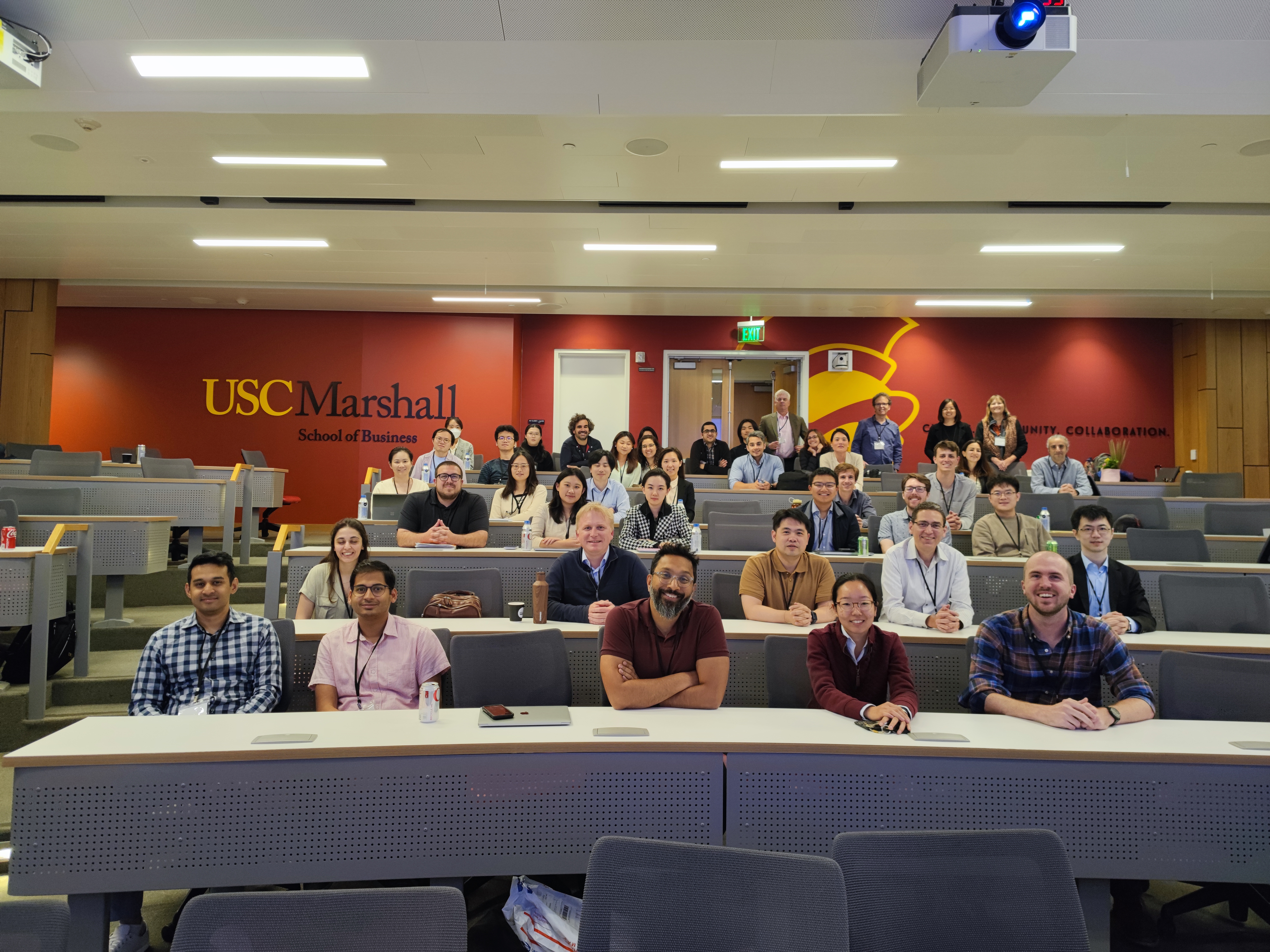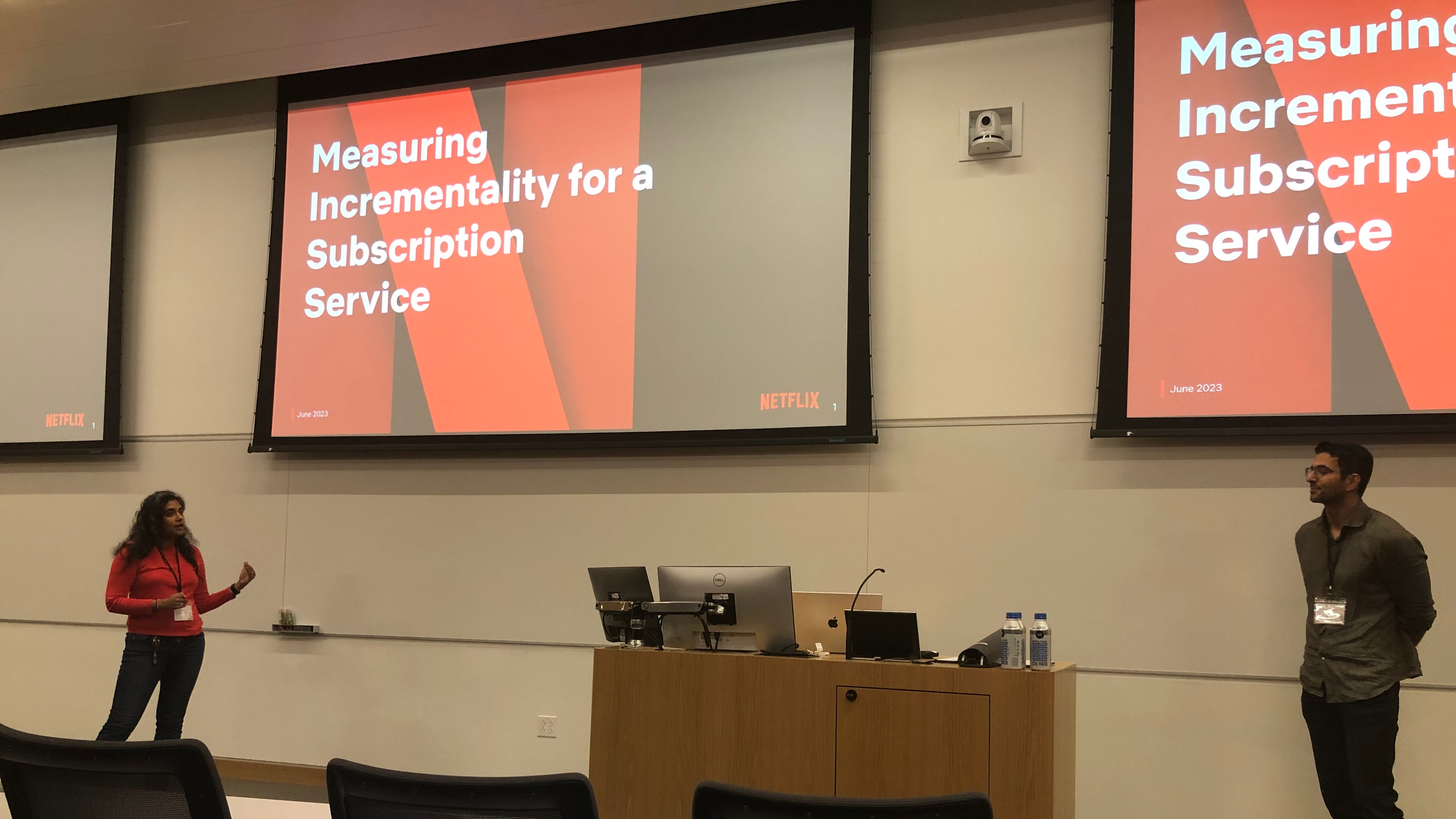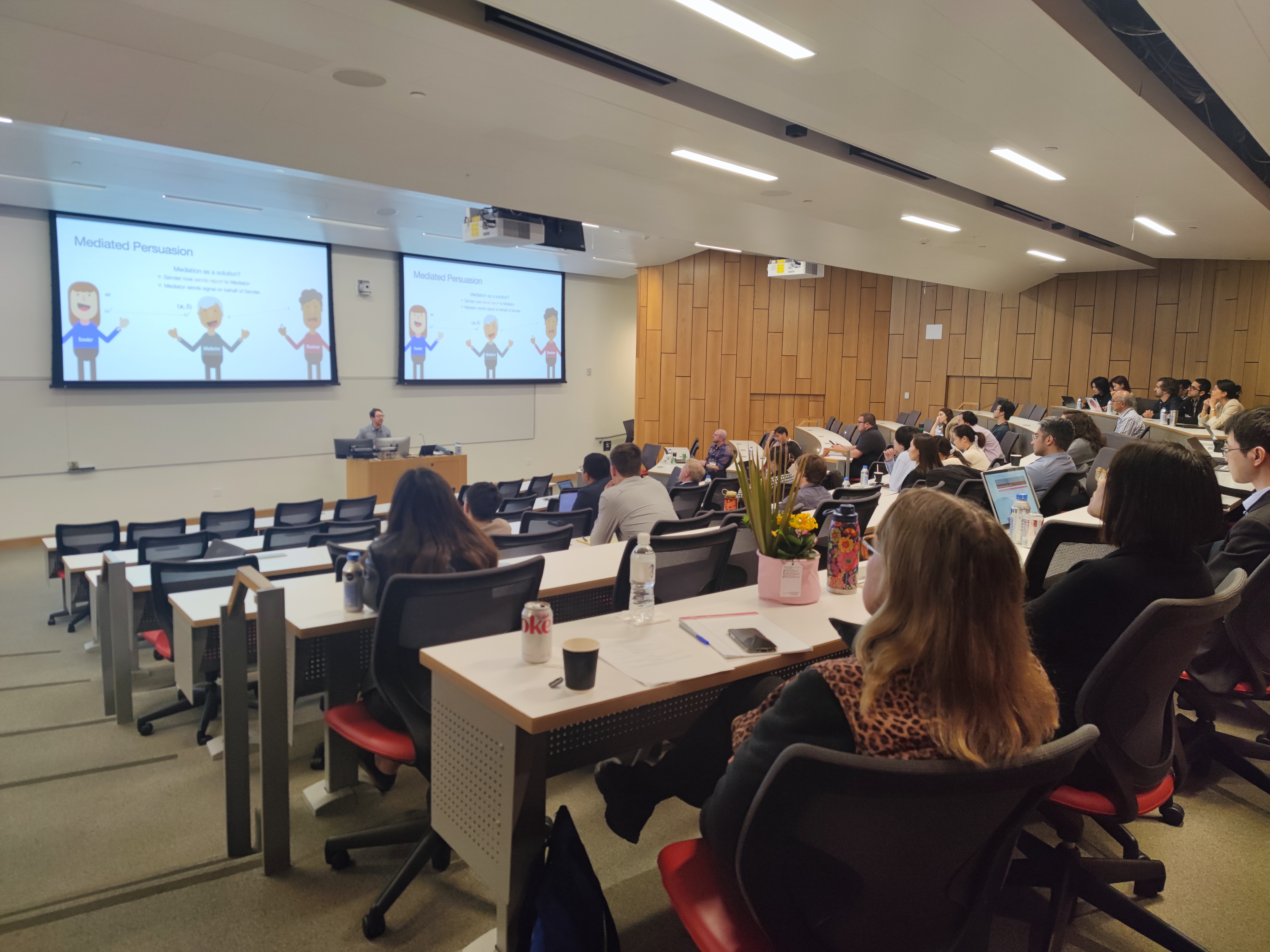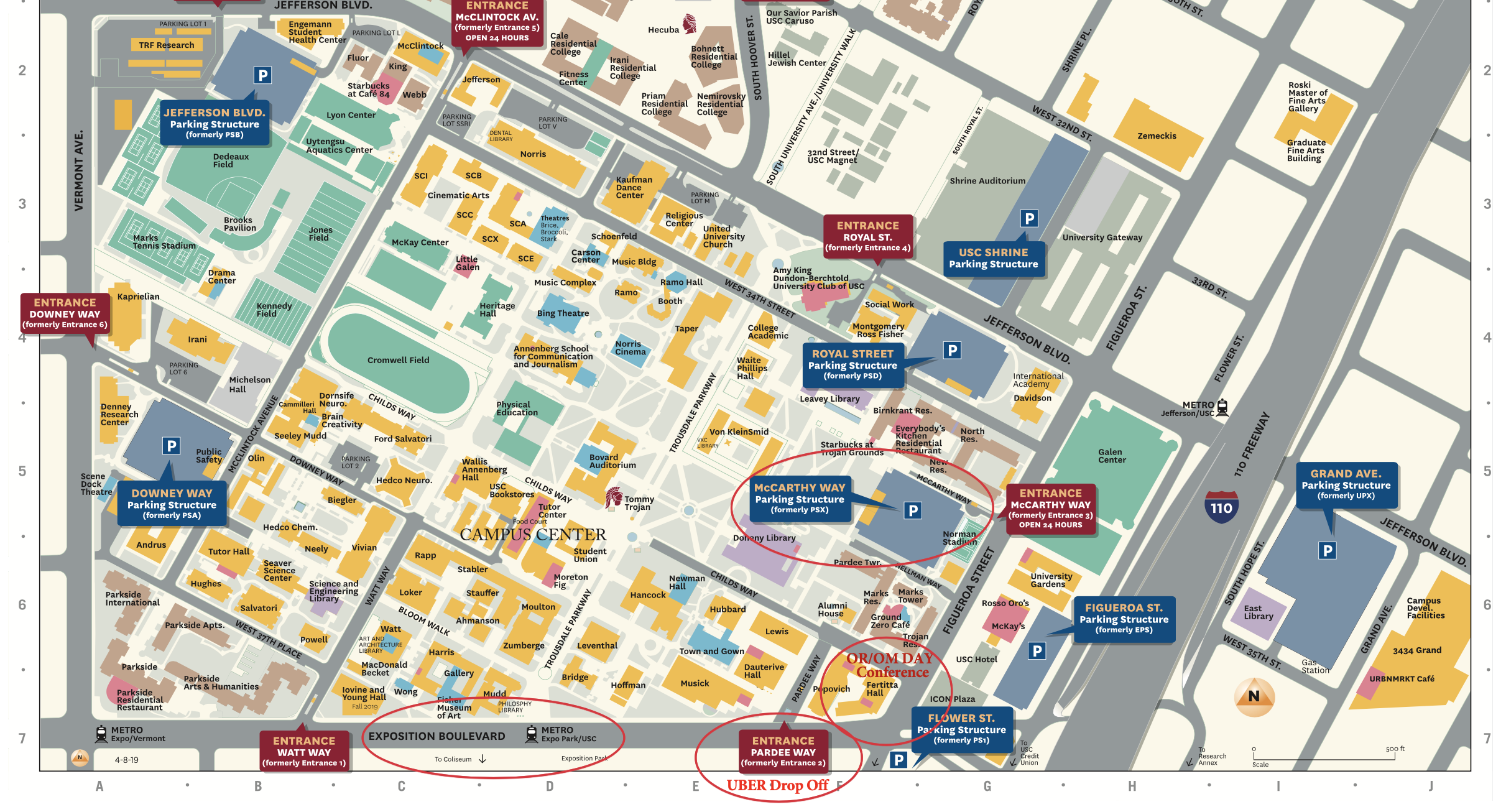
SoCal OR/OM Day 2023 at USC Marshall
After a three-year hiatus, we had the pleasure to once again bring together operations researchers across the Southern California region to connect with one another in the broader OR/OM community. The event took place on Monday May 15th, at the University of Southern California Marshall School of Business.
See you next year in Westwood!
Thanks for Attending!



Schedule
| 8:00 am - 8:30 am: |
Welcome, Check-In, and Coffee |
| 8:30 am - 10:00 am: |
Angela Zhou (USC)
Empirical Gateaux Derivatives for Causal Inference and Optimization-Based EstimatorsAbstract coming soon
|
John Turner (UC Irvine)
How to Conclude a Suspended Sports League?Professional sports leagues may be suspended due to various reasons such as the recent COVID-19 pandemic. A critical question the league must address when re-opening is how to appropriately select a subset of the remaining games to conclude the season in a shortened time frame. Despite the rich literature on scheduling an entire season starting from a blank slate, concluding an existing season is quite different. Our approach attempts to achieve team rankings similar to that which would have resulted had the season been played out in full. We propose a data-driven model which exploits predictive and prescriptive analytics to produce a schedule for the remainder of the season comprised of a subset of originally-scheduled games. Our model introduces novel rankings-based objectives within a stochastic optimization model, whose parameters are first estimated using a predictive model. We present simulation-based numerical experiments from previous National Basketball Association (NBA) seasons 2004-2019, and show that our models are computationally efficient, outperform a greedy benchmark that approximates a non-rankings-based scheduling policy, and produce interpretable results. Our data-driven decision-making framework may be used to produce a shortened season with 25-50 % fewer games while still producing an end-of-season ranking similar to that of the full season, had it been played.
|
Xinyi Guan (UCLA)
Randomized Robust Price OptimizationAbstract coming soon
|
|
| 10:00 am - 10:30 am: |
Coffee Break |
| 10:30 am - 11:45 pm: |
David Kempe (USC CS)
Allocating with Priorities and Quotas: Algorithms, Complexity, and DynamicsIn many applications such as rationing medical care and supplies, university admissions, and the assignment of public housing, the decision of who receives an allocation can be justified by various normative criteria (ethical, financial, legal, etc.). Such settings have motivated the following priority-respecting allocation problem: several categories, each with a quota of interchangeable items, wish to allocate the items among a set of agents. Each category has a list of eligible agents and a priority ordering over these agents; agents may be eligible in multiple categories. The goal is to select a valid allocation: one that respects quotas, eligibility, and priorities, and ensures Pareto efficiency.
We provide a complete algorithmic characterization of all valid allocations, exhibiting a bijection between these allocations and maximum-weight matchings under carefully chosen rank-based weights. This recovers and extends known results in this space and enables two wide-reaching extensions:
1. Selecting valid allocations that satisfy additional criteria: Via three examples -- inclusion/exclusion of some chosen agent; agent-side Pareto efficiency vs. welfare maximization; and fairness from the perspective of allocated vs. unallocated agents -- we show that finding priority-respecting allocations subject to some secondary constraint straddles a complexity knife-edge; in each example, one problem variant can be solved efficiently, while a closely related variant is NP-hard.
2. Efficiency-envy tradeoffs in dynamic allocation: In settings where allocations must be made to T agents arriving sequentially via some stochastic process, we show that while insisting on zero priority violations leads to an Ω(T) loss in efficiency, one can design allocation policies ensuring that the sum of the efficiency loss and priority violations in hindsight is O(1).
|
Reza Badri and Meghana Bhatt (Netflix)
Measuring Incrementality - Applications for a Subscription BusinessAbstract coming soon
|
|
| 11:45 pm - 1:00 pm: |
Lunch |
| 1:00 pm - 2:30 pm: |
Auyon Siddiq (UCLA)
Discovering Causal Models with Optimization: Confounders, Cycles, and Instrument ValidityAbstract coming soon
|
Justin Mulvany (USC)
Blockchain Mediated PersuasionAbstract coming soon
|
Zuguang Gao (UC Irvine)
Finite-Sample Analysis of Decentralized Q-Learning for Stochastic GamesLearning in stochastic games is arguably the most standard and fundamental setting in multi-agent reinforcement learning (MARL). In this talk, we consider decentralized MARL in stochastic games in the non-asymptotic regime. In particular, we establish the finite-sample complexity of fully decentralized Q-learning algorithms in a significant class of general-sum stochastic games (SGs) – weakly acyclic SGs, which includes the common cooperative MARL setting with an identical reward to all agents (a Markov team problem) as a special case. We focus on the practical while challenging setting of fully decentralized MARL, where neither the rewards nor the actions of other agents can be observed by each agent. In fact, each agent is completely oblivious to the presence of other decision makers. Both the tabular and the linear function approximation cases have been considered. In the tabular setting, we analyze the sample complexity for the decentralized Q-learning algorithm to converge to a Markov perfect equilibrium (Nash equilibrium). With linear function approximation, the results are for convergence to a linear approximated equilibrium – a new notion of equilibrium that we propose – which describes that each agent’s policy is a best reply (to other agents) within a linear space. Numerical experiments are also provided for both settings to demonstrate the results.
|
|
| 2:30 pm - 3:00 pm: |
Closing Remarks and Coffee |
Location
All talks will be held in Fertitta Hall (JFF) LL105. Coffee, refreshments, and lunch will be offered in the Fertita Hall first floor dining area and the adjoining courtyard.
Transportation
Parking passes have been provided to registrants who requested them. Additionally, USC Marshall is located near the Expo Park/USC Metro station, so attending SoCal OR/OM Day 2023 via public transportation may also be a convenient option.

Registration
To reserve your spot at the conference, provide dietary preferences, and receive parking details (if needed), please click here to register no later than 12:00 pm on Friday May 12. Registration is free.
Interested but not sure you can attend?
If you're interested in the 2023 SoCal OR/OM Mini-Conference (or future editions) but not yet certain you can attend, please fill out this interest form. We will keep you updated on conference details and deadlines.
Prior Years
For reference, here are details of the 2016, 2017, and 2019 SoCal OR/OM Days.
Contact
For any questions or concerns, please contact the organizers here.
Website designed with assistance from ChatGPT by OpenAI.




